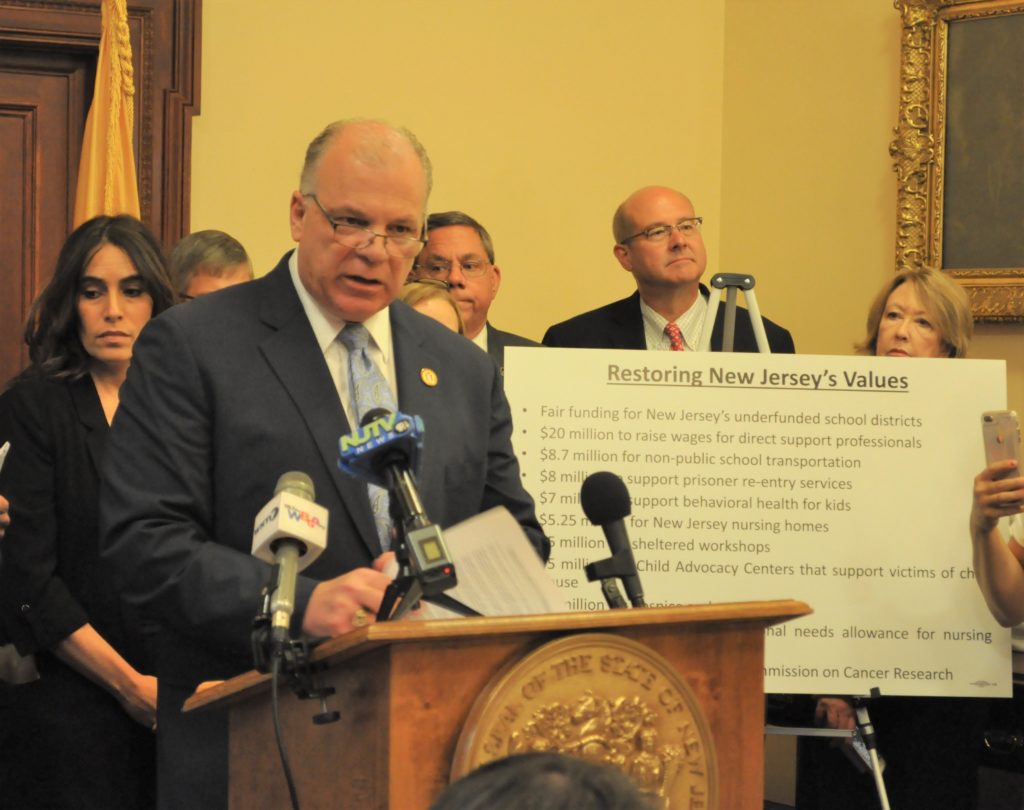Sweeney, Greenwald Stress Need for Fiscal Reforms at ‘Path to Progress’ Town Meeting

Sweeney, Greenwald Stress Need for Fiscal Reforms at ‘Path to Progress’ Town Meeting
Senate President, Assembly Majority Leader focus on pension overhaul, benefits reform and property tax relief at Rowan event
SEWELL – Senate President Steve Sweeney and Assembly Majority Leader Lou Greenwald tonight warned that New Jersey won’t be able to make critical investments in education, transportation, higher education and social services unless it enacts major structural reforms to address the looming budget crisis fueled by runaway pension and benefit costs.
Speaking at a town hall meeting at Rowan College at Gloucester County, Senator Sweeney and Assemblyman Greenwald warned that New Jersey is facing a dire fiscal crisis and laid out a series of solutions developed by the bipartisan Economic and Fiscal Policy Workgroup of economists, academics and fiscal policy experts to address the problem.
“Without major structural reforms, New Jersey’s pension and benefit costs will go up $4.2 billion over the next four years,” said Senator Sweeney (D-Gloucester/Salem/Cumberland). “If we don’t fix the built-in costs of the pension system and better control the cost of benefits, we will be facing a multi-billion-dollar deficit in the years ahead. Those costs only pay for running the government. It doesn’t do anything to expand preschool, invest in our universities, fully fund state aid to local school districts, or to provide social services for those who need it.”
“We need to make our state more affordable – not less affordable – for our hard-working middle-class families, for new college graduates and millennials deciding where they are going to live, and for senior citizens trying to decide whether they can afford to stay,” the Senate President said.
Assemblyman Greenwald (D-Camden), who co-chaired the Economic and Fiscal Policy Workgroup, said many of the recommendations in the group’s Path to Progress report could make New Jersey both more competitive and more affordable.
“Property taxes are the No. 1 issue in New Jersey, and several of these recommendations have the real potential to save money for the state budget while also creating savings for local property taxpayers,” Assemblyman Greenwald said. “There exists the potential for savings with initiatives, such as K-12 regionalization, increased use of shared services at both the county and municipal level, and shifting the cost of Extraordinary Special Education from the local to the state level. If there are recommendations that can lead to real property tax reform to ease the burden on New Jerseyans, it is a discussion that must take place.”
Senator Sweeney said the new hybrid pension system recommended by the Economic and Fiscal Policy Workgroup is not a new idea; 12 states, including Pennsylvania, Rhode Island and Ohio, have already adopted hybrid systems. The plan would fully preserve the existing pension system for teachers and state, county and municipal employees with five years of service.
“Shifting healthcare coverage from the current “Platinum-Plus-Plus” system to a Gold-level health care plan comparable to those offered by New Jersey’s largest private sector companies to their employees makes sense,” Senator Sweeney said. “One of the best things about the shift from Platinum to Gold is that teachers and other public employees would save over $200 million that they are paying out of their paychecks toward their health premiums for a level of coverage most of them are never going to use.”
Fred Keating, President of Rowan College at Gloucester County, introduced Senator Sweeney and Assemblyman Greenwald at the forum.







